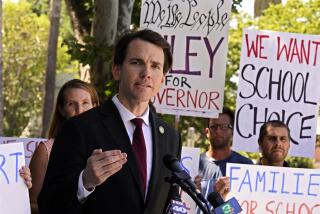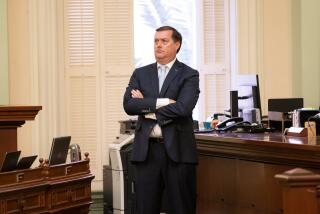Panel Limits Hart in Using ’88 Funds to Pay ’84 Debts
- Share via
WASHINGTON — Gary Hart’s creditors suffered another in a long series of setbacks Thursday as the Federal Election Commission ruled that Hart cannot use any 1988 campaign funds to pay off his $1.1-million 1984 debt until the 1988 campaign books are audited and questions about them resolved, a process that could take years.
Meanwhile, the FEC decided that extremist Lyndon H. LaRouche Jr. is eligible to receive taxpayer money in the form of federal matching funds to subsidize his campaign. LaRouche, whose campaign committee claims to have raised close to $890,000 during the first two months of this year, will receive an initial $100,000 matching fund payment at the beginning of April.
Hart received about $1.1 million in matching funds and had asked the FEC for permission to use some of that money to pay off 1984 debts. But the FEC ruled unanimously that he could not, saying that matching funds are provided only for one campaign at a time, not for “a combined campaign spanning two presidential election cycles.”
Settles Most Debts
At the end of the 1984 campaign, Hart owed $4.75 million. Since then, he has settled debts with most of his creditors, at times for as little as 10 cents on the dollar, bringing the debt down to a little more than $1.1 million.
As a practical matter, Hart’s 1988 campaign already has spent most of its matching funds as well as most of the money it raised and expects to close its books with a surplus that is considerably less than Hart’s 1984 debts, probably less than $200,000, according to Hart’s campaign lawyer, Bernard Schneider of Newport Beach, Calif.
The remaining hope for Hart’s creditors is that he can raise new money to pay off his old debts. “We are very hopeful that we’re soon going to be able to announce an agreement” with at least one major creditor, Semper-Moser Associates, for a “cooperative effort” to raise money, Schneider said.
Under the cooperative agreement, Hart and his creditors jointly would approach people who gave money to the 1988 campaign but who did not give the $1,000 maximum to the 1984 campaign and ask them to contribute to a fund to retire the 1984 debt.
Lawyers Develop Strategies
Last year, Semper-Moser, a public relations consulting company based in Venice, Calif., embarrassed Hart by having federal marshals seize money at two high-priced Los Angeles fund raisers. Since then, however, the firm’s and Hart’s lawyers have been working together to develop fund-raising strategies, Schneider said.
The 5-1 LaRouche decision, which is also expected to qualify LaRouche for California’s June 7 Democratic primary ballot, overruled the commission’s auditors, who had recommended early in March that LaRouche be barred from receiving matching funds because of persistent questions over whether he had complied with federal fund-raising laws.
LaRouche is on trial in Boston on a federal indictment that, among other things, accuses him of fraud in connection with high-pressure fund-raising tactics in his 1984 presidential campaign.
Confusion Over Intent
LaRouche’s matching fund request became an issue when FEC auditors found evidence that many of the people whose checks LaRouche had counted as campaign contributions in fact had thought they were contributing to other things, such as LaRouche’s campaign against AIDS or his efforts in favor of President Reagan’s “Star Wars” Strategic Defense Initiative.
But the FEC adopted the advice of its lawyers, who ruled that the evidence of violations was too spotty to justify denying LaRouche’s request for matching funds.
Under federal law, a presidential candidate who raises $5,000 in each of 20 states can receive tax dollars to match contributions up to $250. The money comes from the $1 checkoff on federal income tax forms.
More to Read
Get the L.A. Times Politics newsletter
Deeply reported insights into legislation, politics and policy from Sacramento, Washington and beyond. In your inbox twice per week.
You may occasionally receive promotional content from the Los Angeles Times.











